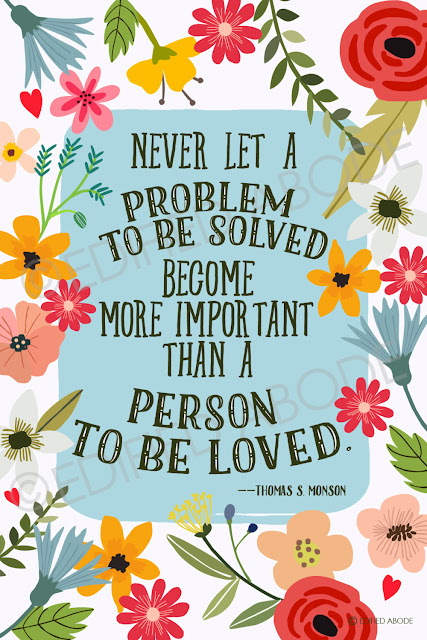W09: Managing Conflict; Consecrating Ourselves
Conflict is a part of life.
No two people, no matter how compatible they are, will get along 100
percent of the time. We all bring our
own emotions, backgrounds and preferences into our relationships and these
differences are bound to cause struggles at some point. But happiness in marriage does not mean an
absence of conflict. Instead, it is
found in how we handle our conflicts, and how we commit ourselves to establishing
Zion within our homes.
 |
| image via: Edified Abode |
R-E-S-P-E-C-T
In his book, The Seven
Principles for Making Marriage Work, Dr. John Gottman outlines his approach
for soliving problems within a marriage.
He says the key to resolving conflict can be found in these 5 steps:1
1) “Soften
your start up.” In other words, make
your approach to the problem soft and loving rather than harsh and critical. Criticism invites defensiveness and anger,
but loving words invite thoughtful discussions and solutions.
2) "Learn
to make and receive repair attempts.” Be
sensitive to those moments when your spouse is trying to steer the conversation
back to friendly ground, through humor or kindness. Let these moments influence you and help
diffuse the tension in the situation.
3) "Soothe
yourself and each other.” Be aware of
one another’s feelings and especially pay attention to when you or your spouse
is feeling flooded by negative emotion.
Find ways to inject love and kindness into the conversation, by words or
actions. People who feel loved are more
likely to be patient and understanding with one another.
4) “Compromise.” We all know that we can’t be right all of the
time. When we find that it’s more
important to be kind then to win the argument, or when we can let go of those
things that aren’t a big priority for us, we can find a balance in our
relationships.
5) "Process
any grievances so they don’t linger.” Don’t let the little things become big
things. Talk to your spouse on a regular
basis and express your feelings so that they don’t build up and become
stumbling blocks in your relationship.
Dr. Gottman says that these principles really all amount to
having – and showing – respect for your spouse.
He says,
“To a certain degree [it] comes down to having good manners. It means treating your spouse with the same respect you offer to company.”2
Often we are willing to go to great pains to show respect
and kindness toward guests in our home, but we may forget to show that same
level of respect towards the ones we share our homes with. One mother illustrated this point when she
shared a story of having some General Authorities of the church, including the
prophet, as guests for a meal in her home.
She was so concerned about having a clean, well-presented house that she
snapped at her son and was angry at him for not cleaning up his breakfast dishes. Later, she apologized to him and made the observation,
“I realized that while trying so hard to
show respect to the special man who would visit my home later that day, I
had-failed to show respect for another special man who lives there every day.
Didn't my son deserve the same respect I was extending to the President of the
Church?”3
When we remember to show basic respect to our family
members, especially to our spouses, we can resolve conflict with less
frustration and more love.
 |
| image via: Mormon Hub |
Consecration
In a sense, our ability to resolve conflict in our marriages
comes down to how we have committed ourselves to building strong marriages and
families. Consecrating ourselves to our
marriage means devoting all that we have – all our energy, time, and efforts –
to building up our spouses and strengthening our homes. Dr. H. Wallace Goddard says,
“Consecration invites us to put everything we have on the alter – to hold nothing back. We are willing to minister to a mixed-up spouse. We are willing to love a failing partner. We bless those who belittle us. We pray for those who have despitefully used us.”4
When we have consecrated ourselves to our partner, and to
the Lord, we are fully committed to building up Zion by building up righteous
families. We hold nothing back. We learn to let go of the natural man (or
woman) and to relinquish those parts of us which tempt us toward revenge,
grudge-holding, or egotism. We learn to
soften our hearts and let the Lord guide us as we choose to care more about
others than ourselves. Dr. Goddard
writes,
“Consecration has everything to do with marriage…It is acting to redeem our partners and our covenants with everything we have and everything we may draw from Heaven. We do this in order to establish Zion in our homes.”5
When we have learned to resolve conflict with respect and
love, and have consecrated ourselves to our marriage, we can enjoy the
blessings that come from a strong, united family. We will find our hearts changed, our natures
becoming more Christlike, and our homes becoming havens of happiness and peace.
1 Source: Dr. John M. Gottman, Ph.D., "The Seven Principles of Making Marriage Work," (2015) Harmony Books, NY



Comments
Post a Comment